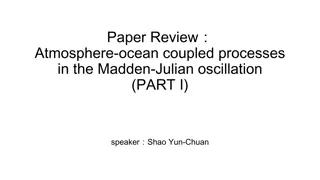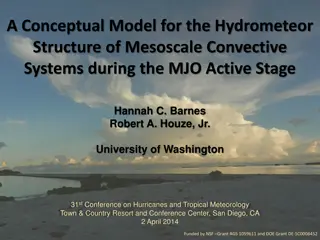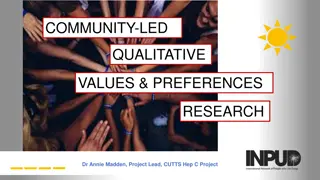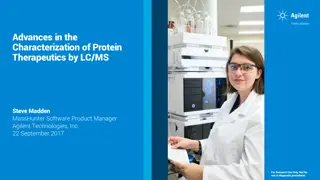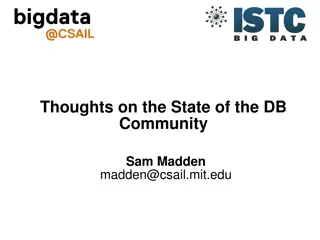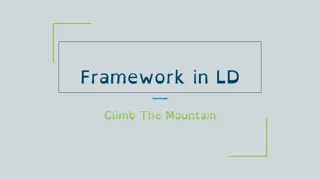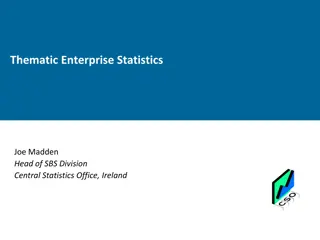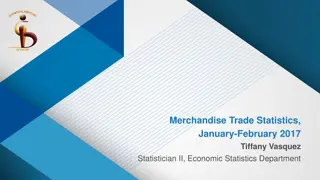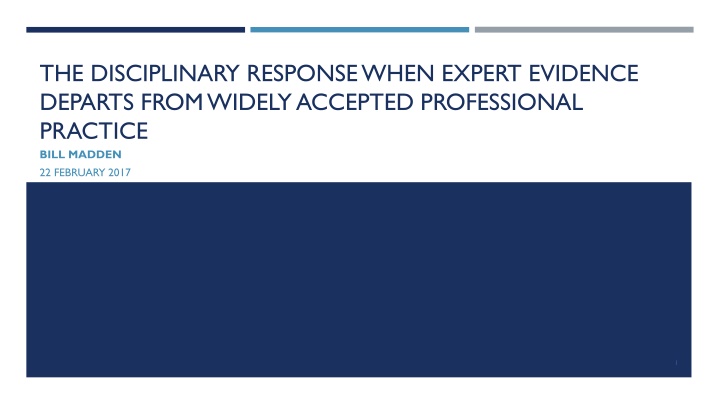
Disciplinary Response to Departure from Accepted Expert Practice
Explore the disciplinary consequences faced by an NHS surgeon who departed from accepted professional practice while giving expert evidence. Discover the role of disciplinary frameworks in handling unsatisfactory expert evidence and the importance of good medical practice in such situations. Consider the implications for medical practitioners and the legal framework.
Uploaded on | 2 Views
Download Presentation

Please find below an Image/Link to download the presentation.
The content on the website is provided AS IS for your information and personal use only. It may not be sold, licensed, or shared on other websites without obtaining consent from the author. If you encounter any issues during the download, it is possible that the publisher has removed the file from their server.
You are allowed to download the files provided on this website for personal or commercial use, subject to the condition that they are used lawfully. All files are the property of their respective owners.
The content on the website is provided AS IS for your information and personal use only. It may not be sold, licensed, or shared on other websites without obtaining consent from the author.
E N D
Presentation Transcript
THE DISCIPLINARY RESPONSE WHEN EXPERT EVIDENCE DEPARTS FROM WIDELY ACCEPTED PROFESSIONAL PRACTICE BILL MADDEN 22 FEBRUARY 2017 1
INNOVATIVE PRACTICE IN GIVING EXPERT EVIDENCE? November 2015 theBMJ reported that a former NHS (UK) surgeon, Dr Francis D Arcy, who made some 1.4 million pounds sterling in expert report fees was struck off the medical register for failure to pay more than 400,000 tax on that income. Asked the lawyers retaining him to provide cheques payable only to his surname and paid some the cheques into the accounts of his four children, all of whom were also doctors in Ireland and in Australia. [Knowledge of those doctors unclear.] The surgeon also pleaded guilty to criminal charges. He was given a two year suspended jail sentence, fined 230,000 and ordered to pay costs of 5,000. 2
PRELIMINARY QUESTION Does the disciplinary framework for medical practitioners have a role in the context of expert evidence, or is a response to unsatisfactory expert evidence best considered as the province of the court before which the evidence is given? 3
GOOD MEDICAL PRACTICE: CODE OF CONDUCT Good Medical Practice: A Code of Conduct for Doctors in Australia expressly refers to medico-legal, insurance or other assessments at clause 8.7 8.9. Clause 8.7.4 requires the provision of an impartial report. Clause 8.8.4 indicates that good medical practice involves making clear the limits of the practitioner s knowledge and not giving opinion beyond those limits when providing evidence. Clause 8.9.1 and 8.9.2 require the provision of accurate, truthful and verifiable information about the practitioner s experience and medical qualifications more precisely, not misrepresenting, by misstatement or omission, the practitioner s experience, qualifications or position. Therefore, Part 8 of the National Law, addressing the Health, Performance and Conduct of medical practitioners should have a legitimate interest in performance issues. 4
NOTIFICATIONS - VOLUNTARY A voluntary notification may be made about a medical practitioner under section 144 of the National Law under the following relevant grounds: (a) that the practitioner s professional conduct is, or may be, of a lesser standard than that which might reasonably be expected of the practitioner by the public or thepractitioner s professional peers; (b) that the knowledge, skill or judgment possessed, or care exercised by, the practitioner in the practice of the practitioner s health profession is, or may be, below the standard reasonably expected. 5
NOTIFICATIONS - MANDATORY Arguably however, a mandatory notification obligation under section 140 of the National Law will not commonly arise, given the definition of notifiable conduct: notifiable conduct, in relation to a registered health practitioner, means the practitioner has (a) practised the practitioner s profession while intoxicated by alcohol or drugs; or (b) engaged in sexual misconduct in connection with the practice of the practitioner s profession; or (c) placed the public at risk of substantial harm in the practitioner s practice of the profession because the practitioner has an impairment; or (d) placed the public at risk of harm because the practitioner has practised the profession in a way that constitutes a significant departure from accepted professional standards. 6
THE INTERESTS OF THE COURTS Uniform Civil Procedure (Amendment No 82) Rule 2016, recently updated the Expert witness code of conduct (UCPR 31.23 & Schedule 7 ) Requirement for the witness to assist the court impartially on matters relevant to the area of expertise of the witness (clause 2) And to state the qualifications of the expert to prepare the report (clause 3c) But no express focus on veracity of the evidence. 7
ADVERSE COMMENTS IN CIVIL COURT DECISIONS R v Chahoud [2013] NSWDC 228 per Berman SC DCJ I should say something about Dr Jacmon. I have in the past been very critical of his reports and nothing I have read in the report tendered today causes me to alter my opinion. His reports suffer from two particular defects. One is that they are virtually identical and almost every report of his I have ever read suggests that "the offender's actions which led to offending indicated markedly diminished capacity for judgment because there appeared to be little thought given to the consequences". The second problem with Dr Jacmon's report is that there is little or no explanation as to how he has drawn conclusions. See also R v Hickson [2010] NSWDC 336; R v Issa & Yousif [2009] NSWDC 337; R v Lee [2008] NSWDC 332. But, no report to regulatory bodies by the trial judge. 9
ADVERSE COMMENTS IN CIVIL COURT DECISIONS But note potential adverse effect of such comments at appellate level. Vakauta v Kelly [1989] HCA 44 at [6] per Brennan, Deane & Gaudron JJ The learned trial judge s comments abotu Dr Lawson, Dr Revai and Dr Dyball in the course of the trial were indeed strong: ...that unholy trinity... Doctors who think that you do a full day s work without any arms or legs ; whose views are almost invariably slanted in favour of the GIO by whom they have been retained, consciously or unconsciously . At [7], the comments in the judgment were such as to cause reasonable apprehension of bias; new trial on damages ordered. 10
THE MUSTAC DECISION Mustac v The Medical Board of Western Australia [2004] WASCA 156 - Allegation predating the National Law, of improper conduct by way of the respondent's use of the Test of Memory Malingering (TOMM test) for psychiatric assessment. Dr Zelko Mustac was frequently engaged to give expert evidence on the subject of the medical condition and capacities of claimants seeking compensation for personal injury 11
THE MUSTAC DECISION Use of the TOMM test in his psychiatric assessment of certain patients knowing that it had been standardised on a North American population and had little or no relevance to an Australian population; Used the TOMM test to conduct a medico-legal assessment of an accident-related compensation claim contrary to the specific purpose for which the test was developed namely detecting feigned amnesia and claims of pervasive difficulties learning new information; Applied the TOMM test to questions of overall veracity in circumstances where it was not designed to generate reliable information as to overall veracity. Dr Mustac s registration was suspended for a period of six months. 12
THE EASTWOOD DECISION An appeal was brought by the psychologist in respect of conditions imposed on the registration of a psychologist by the Psychology Board of Australia: Eastwood v Psychology Board of Australia [2016] ACAT 52. The original complaint focused in part on the reference in the psychologist s report (written for Centrelink against the background of family law proceedings) to parental alienation syndrome , which was not a recognised psychological disorder according to DSM-V. The Tribunal concluded at [34] that the psychologist had become an advocate for his client s cause. There was little sign of an objective professional opinion. Upheld the imposition of conditions but revisited the duration of the conditions imposed. 13
THE SQUIER DECISION Shaken baby evidence on behalf of the accused. Squier v General Medical Council [2016] EWHC 2739 (Admin) - Review the findings of the UK Medical Practitioners Tribunal and an order that Dr Squier s name should be removed from the medical register. The criticisms directed at Dr Squier related to six babies about whom she had provided reports and given evidence. In each case, two or three allegations were made, to the effect that Dr Squier had: Expressed an opinion outside her field of expertise; Made assertions which were insufficiently founded on the evidence available to her; and Purported to rely on research papers which did not support her opinion, in the way suggested by her. 14
THE SQUIER DECISION Review focused on whether dishonest or not; held not dishonest but upheld other findings such as that evidence was misleading. General Medical Council stated afterwards: The objectivity and integrity of doctors who act as expert witnesses is paramount and this judgment reinforces the importance of expert witnesses adhering to their duties to the court. When a doctor departs from them in this way, that is a very serious matter for the reputation of the medical profession and public confidence in the profession and the court process. The ruling makes clear that she acted irresponsibly in her role as an expert witness on several occasions, acted beyond her expertise and lacked objectivity, and sought to cherry-pick research which it was clear did not support her opinions. Allowed to return to clinical practice but not to give expert evidence for 3 years. 15
THE PARENZEE DECISION R v Parenzee [2007] SASC 316 HIV transmission Unprotected intercourse knowing that P had HIV > 3 women > Conviction. At trial P did not dispute he was infected with the HIV virus, or that by engaging in unprotected sexual intercourse he could transmit the virus, or that if the women became infected the virus might cause them to suffer from AIDS and so endanger their lives. Notice of appeal P s legal representatives at trial were unaware of significant matters of fact and significant matters of scientific opinion. HIV virus has never been isolated and has not been proved to exist. It could not be demonstrated that the HIV virus was transmitted by sexual intercourse, even if it existed. No evidence that AIDS was "caused by a unique infectious agent", namely, by the HIV virus. 16
THE PARENZEE DECISION Application for appeal heard by single judge; evidence and submissions over 7 days. Ms Papadopulos-Eleopulos and Dr Turner were not qualified to express an opinion, as an expert, on the question of whether it had been proved that HIV existed as a distinct or separate virus, on the question of whether the virus was transmitted by sexual intercourse nor on the question of whether the HIV virus was the or a cause of AIDS. He rejected their evidence: R v Parenzee [2007] SASC 143 17
THE PARENZEE DECISION Ms Eleni Papadopulos-Eleopulos - A degree in nuclear physics from the University of Bucharest in Romania (1960). Dr Valendar Turner had the degrees of Bachelor of Medicine and Bachelor of Surgery, and is a Fellow of the Royal Australasian College of Surgery and of the Royal Australasian College for Emergency Medicine. Evidence rejected on grounds of expertise, cogency etc. No record of disciplinary action re Dr Turner (who appears on AHPRA as practising in Western Australia) 18
THE PARENZEE DECISION At [61]: Like the single Judge, this Court can do no more than act on the material now before it. That material overwhelmingly supports the conclusion that the HIV virus exists and is identifiable, that the HIV virus can be transmitted by sexual intercourse, and that it causes AIDS: Parenzee at [250], at [323] and at [337] 19
DISCUSSION 20
SCOPE FOR PROBLEMS TO ARISE? Study in Victoria by Grant & Studdert identified a cohort of 4 per cent of non- treating experts who were involved in 30 per cent of all the studied cases. G Grant and D M Studdert, The Injury Brokers: An Empirical Profile of Medical Expert Witnesses in Personal Injury Litigation (2013) 36(3) Melbourne University Law Review 832. 21
COMPLAINTS REGARDING EXPERT OPINION EVIDENCE The Board regularly receives notifications about medical practitioners who perform medico-legal or third party assessments. The Board will not take further action when a single notification does not appear to amount to unprofessional conduct or unsatisfactory professional performance. However, the Board may decide to take action in relation to practitioners who have been the subject of multiple notifications. Medical Board of Australia; June 2014 http://www.medicalboard.gov.au/News/Newsletters/June-2014.aspx In 2016, Avant reported a recent increase in complaints regarding medicolegal assessments. http://www.avant.org.au/resources/public/20150928-when-medico-legal-assessments-bite-avoiding-client-complaints/ 22
DISCIPLINARY RESPONSES TO EXPERT OPINION EVIDENCE Small number of reported disciplinary decisions considering expert opinions said to be outside expertise or flawed. Apparently no disciplinary decisions considering expert opinion conduct which was expressly sought to be defended as indicating new or innovative practice. 23
CONCLUSIONS Despite scope for court responses to dubious expert opinion evidence, little sign of courts wishing to grapple with that problem directly. Quite useful to have scope for disciplinary action to fill what otherwise might be a lack of remedy . Do the reported increases in complaints (generally and in relation to medico legal assessments), and the Eastwood and Squier examples, foreshadow increased disciplinary focus on dubious opinion evidence? However expert evidence promoting innovative practice, unless extreme, seems unlikely to give rise to disciplinary action. 1. 2. 3. 4. 24








